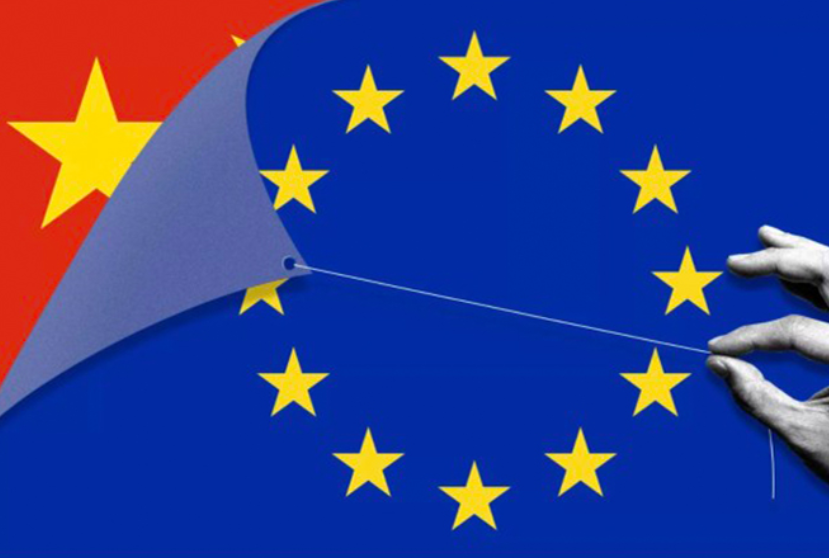-
CENTRES
Progammes & Centres
Location
Although Germany’s China strategy and the UK report didn’t meet the desired expectations, they still indicate Europe’s recalibration of its China policy

There is no denying that the European countries are recalibrating and rethinking their outlooks towards China. At the European Union (EU) level, the 2019 strategy on China laid the groundwork for the other European countries to assess their respective relations with Beijing and come out with their country-specific analysis. In this regard, July 2023 saw the release of two important documents—First was the release of Germany’s much-awaited China strategy and second, was the United Kingdom’s (UK) Intelligence and Security Committee of Parliament’s report on China. These two documents, while recognising the threats from China—could not be more different from one another. While the German policy bought to the fore the government’s critical balancing between threats and opportunities that China brings to the table, the UK report called out the shortfalls in the government’s approach which was called ‘completely inadequate’.
The German strategy, on one hand, presents the government’s view on what can be called as the ‘China challenge’ and on the other, outlines measures to counter this challenge. While the strategy, in detail, analyses the threats and challenges that Beijing poses not only to German interests but also to European values and interests, it remains elusive on how the government hopes to tackle this challenge. However, the strategy marks a new phase in Germany’s evolving policy outlook towards Beijing starting from the premise that as China has changed, German policy towards the country should also change. The strategy calls out China for trying to “reshape the existing rules-based international order according to its preferences” and makes marked references to human rights violations in Tibet, Xinjiang, and Hong Kong and the increasing cooperation with Russia, which is a source of concern for Germany. It points out that “China combines great economic, technological, military and political power”—thereby bringing its economic powers to achieve its political goals. In assessing its own relations with Beijing, the strategy highlights that “China’s conduct and decisions have caused the elements of rivalry and competition in our relations to increase in recent years,” which is a key reason as to why the German government is recalibrating its approach towards Beijing. It calls for closer cooperation with the EU and its allies in coordinating their actions on China, specifically in terms of de-risking.
The strategy calls out China for trying to “reshape the existing rules-based international order according to its preferences” and makes marked references to human rights violations in Tibet, Xinjiang, and Hong Kong and the increasing cooperation with Russia, which is a source of concern for Germany.
While the strategy expansively delves into understanding the challenge, how it is going to respond to the same remains a weakness. The government appears to be following a cautious approach when it says that “systemic rivalry with China does not mean that we cannot cooperate”, adding that the government “is seeking to cooperate with China on the basis of fair conditions”—however, what those fair conditions are remain undefined. Interestingly, the areas of cooperation appear to have narrowed down to climate mitigation and people-to-people connect. Another critical aspect is that while it seeks to diversify its trade and investment relations away from China, the strategy places the onus on businesses as it calls on its industry to increase its risk awareness, warning that they will have to bear the financial risk in case of geopolitical tensions. It provides no specifics on how it will diversify away from China on critical infrastructure, or screening of outbound investments or joint research, despite pointing out that “Chinese cyber actors are engaged in economic and academic espionage in an attempt to gain access to German corporations’ trade and research secrets.”
With the intense focus on the release of the German strategy, the UK’s Intelligence and Security Committee (ISC) of Parliament’s report on China was somewhat lost in discussions and debates. While the German strategy represented the Federal government’s outlook to deal with the challenges emerging from a changing China, the UK’s inquiry report highlighted what is wrong with the government’s approach. It called out the government’s failure to formulate an effective policy to deal with the national security threats from China. It identified China’s ‘whole of government approach’ responsible for Beijing’s overt impact on its national security which is done “through its economic might, its takeovers and mergers, its interaction with Academia and Industry—as opposed to covert activity carried out by its intelligence officers”. The ISC report called out the British government for not having any strategy on China and “failing to deploy a ‘whole-of-government’ approach when countering the threat from China”. The report is extremely critical of the UK government on what it calls the “lack of effective oversight” specifically in terms of unchecked Chinese investments in the UK—where the government “does not want there to be any meaningful scrutiny of sensitive investment deals”.
With the intense focus on the release of the German strategy, the UK’s Intelligence and Security Committee (ISC) of Parliament’s report on China was somewhat lost in discussions and debates.
While there are points of convergences between the UK and German outlooks, how they should be addressed is very different. For example, while the German strategy makes passing reference to Chinese interference and espionage in the cyber, economic, and political space, the ISC report delves deeper into three critical sectors and provides a case-study of Chinese interference in academia, industry, and technology, and the UK’s civil nuclear energy. It points out that “China’s ruthless targeting is not just economic; it is similarly aggressive in its interference activities, which it operates to advance its own interests, values and narrative at the expense of those of the West”. Both the reports also make similar references to China’s global ambitions through the transformation of the international rules-based system which is aligned to its interests and priorities; and the increasing cooperation between Beijing and Moscow which is based on “shared interests that include seeking to erode the established world order, for strategic advantage”. Another converging point is the realisation that dealing with China and the challenges that it poses would require a critical balancing between ‘security and prosperity’. While both documents highlight that the governments are aware of the threats, how they are going to address them remains elusive. The German strategy does not list out effective policy options to counter these threats, while the ISC report calls out the lack of action from the government to protect critical assets as “a serious failure, and one from which the UK may feel the consequences for years to come.”
If there was an expectation of a Zeitenwende moment with German strategy on China, then the document appears to be a bit of disappointment. It largely follows through a balancing act between calling out Chinese actions and keeping options of cooperation open. While the strategy provides a clear outlook on understanding the threats and challenges that China poses, much will depend on the implementation of the policy as well as on the political leadership to walk the talk. This is primarily because, for a long time, the German policy outlook towards China has been driven by its businesses and industry, therefore any diversification away from Beijing would require a concerted effort by the German companies, which invested over 10 billion euros in China in 2022. Whether they are going to do so remains to be seen. However, what this strategy represents is the general mood in Europe vis-á-vis China—the idea that it represents a long-term threat.
Another converging point is the realisation that dealing with China and the challenges that it poses would require a critical balancing between ‘security and prosperity’.
This was something that was also called out by the UK ISC inquiry report when it pointed out that the UK government had failed to think long-term and has focused on short-term threats from China. Despite the fact that Prime Minister Rishi Sunak had called China an ‘epoch-defining challenge’ to the world order, he had refrained from calling Beijing a threat. The inquiry report had called out the government over lack of “necessary resources, expertise or knowledge of the threat to counter China’s approach”. While this report puts the UK with mainstream European countries as they focus on formulating their respective responses to China, the inquiry report calls out the lack of a decisive policy outlook and puts the onus on the UK government to ‘understand and counter the threat from China’. While there is a lot to be desired from these two policy documents, but what they represent is important—it is the reshaping of European thinking towards China.
Ankita Dutta is a Fellow with the Strategic Studies Programme at the Observer Research Foundation
The views expressed above belong to the author(s). ORF research and analyses now available on Telegram! Click here to access our curated content — blogs, longforms and interviews.

Ankita Dutta was a Fellow with ORFs Strategic Studies Programme. Her research interests include European affairs and politics European Union and affairs Indian foreign policy ...
Read More +